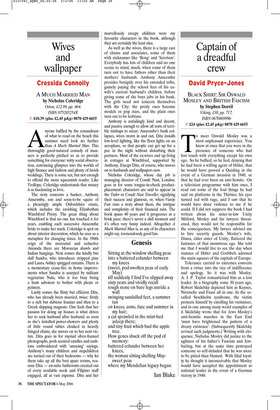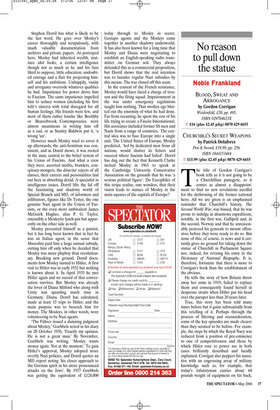Captain of a dreadful crew
David Pryce-Jones
BLACK SHIRT: SIR OSWALD MOSLEY AND BRITISH FASCISM by Stephen Dorril Viking, £30, pp. 717, ISBN 0670869996 ✆ £24 (plus £2.45 p&p) 0870 429 6655 To meet Oswald Mosley was a most unpleasant experience. You knew at once that you were in the presence of someone who had lost touch with everything except his own ego. So he bullied, so he lied, denying that he had been a willing agent of Hitler, that he would have proved a Quisling in the event of a German invasion in 1940, or that he had ever been an anti-Semite. On a television programme with him once, I read out some of the foul things he had said on platforms in the Thirties; his eyes turned red with rage, and I saw that he would have done violence to me if he could. If I did not suppress the book I had written about his sister-in-law Unity Mitford, Mosley and his lawyers threatened, they would not be responsible for the consequences. My lawyer advised me to hire security guards. Mosley’s wife, Diana, elder sister of Unity, flattered the fantasies of that monstrous ego. She told me that I would live to see the day when statutes of Hitler and Goebbels adorned the main squares of the capitals of Europe.
Tolerance carried to extremes converts from a virtue into the vice of indifference and apology. So it was with Mosley. A. J. P. Taylor romanticised him as a lost leader. In a biography some 30 years ago, Robert Skidelsky depicted him as Keynes, Nietzsche and Faust all in one. In the socalled Stockholm syndrome, the victim protects himself by extolling his victimiser, and in one among many weird examples of it Skidelsky wrote that for Jews Mosley’s anti-Semitic marches in the East End ‘must have brightened the pattern of a dreary existence’. (Subsequently Skidelsky revised such judgments.) Writing with eloquence, Nicholas Mosley did justice to the ugliness of his father’s Fascism and Jewbaiting, but at the same time portrayed someone so self-deluded that he was more to be pitied than blamed. With filial loyalty he thought it inconceivable that Mosley would have accepted the appointment as national leader in the event of a German victory in 1940. Stephen Dorril has what is likely to be the last word. He goes over Mosley’s career thoroughly and scrupulously, with much valuable documentation from archives and private papers. As portrayed here, Mosley had inherited wealth, matinée idol looks, a certain intelligence though not as much as he and his fans liked to suppose, little education, undoubted courage and a flair for projecting himself and his ambitions. Unhappily, vanity and arrogance overrode whatever qualities he had. Impatience for power drove him to Fascism. The same impatience impelled him to seduce women (including his first wife’s sisters) with total disregard for all human feelings. His friends were few, and most of them rather louche like Boothby or Beaverbrook. Contemporaries were almost unanimous in writing him off as a cad, or as Stanley Baldwin put it, ‘a wrong ’un’.
However much Mosley tried to cover it up afterwards, the anti-Semitism was consistent, and as Dorril shows, it was rooted in the man, central to the belief system of his Union of Fascists. And what a crew they were, assorted misfits, brawlers, conspiracy-mongers, the déraciné rejects of all classes, their careers and personalities laid out here in absorbing detail. A specialist in intelligence issues, Dorril lifts the lid off the fascinating and shadowy world of Special Branch and MI5, of informers and infiltrators, figures like Dr Tester, the one genuine Nazi agent in the Union of Fascists, or the even more ambivalent James McGuirk Hughes, alias P. G. Taylor, ostensibly a Mosleyite lynch-pin but apparently on the other side as well.
Mosley presented himself as a patriot, but it has long been known that in fact he was an Italian agent, in the sense that Mussolini paid him a large annual subsidy, cutting him off only when he decided that Mosley was more playboy than revolutionary. Breaking new ground, Dorril documents how Mosley turned to Hitler. A first visit to Hitler was in early 1932 but nothing is known about it. In April 1935 he met Hitler again and no record of that conversation survives. But Mosley was already the lover of Diana Mitford who along with Unity was spending much time in Germany. Diana, Dorril has calculated, made at least 15 trips to Hitler, and the main purpose was to beseech him for money. The Mosleys, in other words, were volunteering to be Nazi agents.
‘The Führer issued a damning judgment about Mosley,’ Goebbels noted in his diary on 20 October 1936, ‘Exactly my opinion. He is not a great man.’ By November, Goebbels was writing, ‘Mosley wants money again. Not at the moment.’ To gain Hitler’s approval, Mosley adopted more overtly Nazi policies, and Dorril quotes an MI5 report noting ‘his closer approach to the German spirit in his more pronounced attacks on the Jews’. By 1937 Goebbels was getting the equivalent of £128,000 today through to Mosley in secret. Gestapo agents and the Mosleys came together in another shadowy underworld. It has also been known for a long time that Mosley and Diana were negotiating to establish an English-speaking radio transmitter on German soil. They always defended this as a commercial proposition, but Dorril shows that the real intention was to launder regular Nazi subsidies by this means. The war closed off this scam.
In the context of the French resistance, Mosley would have faced a charge of treason and the firing squad. Imprisonment in the war under emergency regulations taught him nothing. That swollen ego blotted out the enormity of what he had done. Far from recanting, he spent the rest of his life trying to create a Fascist International. His associates included former SS men and Nazis from a range of countries. The central idea was to fuse Europe into a single unit. The United States of Europe, Mosley predicted, ‘led by dedicated men from all nations, would shatter its fetters and succeed where fascism had failed’. Dorril has dug out the fact that Kenneth Clarke invited Mosley in 1961 to speak at the Cambridge University Conservative Association on the grounds that he was ‘a serious political figure’. Do Europhiles of this stripe realise, one wonders, that their vision leads to statues of Mosley in the main squares of the capitals of Europe?















































 Previous page
Previous page